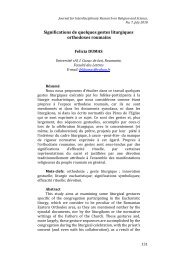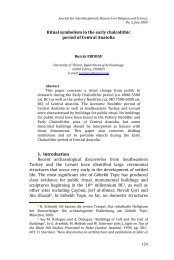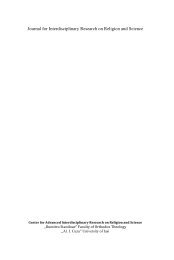Religious Dualism: Some Logical and Philosophical Difficulties
Religious Dualism: Some Logical and Philosophical Difficulties
Religious Dualism: Some Logical and Philosophical Difficulties
You also want an ePaper? Increase the reach of your titles
YUMPU automatically turns print PDFs into web optimized ePapers that Google loves.
AFLOROAEI - <strong>Religious</strong> <strong>Dualism</strong>: <strong>Some</strong> <strong>Logical</strong> <strong>and</strong> <strong>Philosophical</strong> <strong>Difficulties</strong><br />
world <strong>and</strong> admit that there is a real epiphany of light in<br />
nature 32 . Their radicalism is seriously diminished, at least by<br />
this veneration for the created universe. Therefore, the<br />
religious dualism cannot be historically identified with one<br />
religious tradition or another. This is one of the reasons why<br />
Ioan Petru Culianu considers the religious dualism more as a<br />
system of thinking, able to produce innumerable variants than<br />
as a religious doctrine 33 . “The study of this process represents the<br />
object of our research. To describe it, we need to use binary oppositions<br />
at various (innumerable) points of the mythical story. At the end of our<br />
research, we will observe that «the dualisms of the Occident» represent<br />
only a part of the alternatives which they had at their disposal. Modern<br />
times seem to have done the rest” 34 .<br />
Here we have to make another observation. As it is known,<br />
there is an eloquent work for the Cathar doctrine, Liber de<br />
duobus principiis (The Book of the Two Principles) which<br />
consists of seven volumes elaborated under the influence of<br />
Ioan de Lugio, who became the bishop of the Cathar church in<br />
Bergamo in the mid-13 th century. The Book of the Two<br />
Principles refers to two cosmic principles, the Good <strong>and</strong> the<br />
Evil. Ioan de Lugio’s epigones could not accept the idea of a<br />
single cosmogonic principle, as long as the evil exists in our<br />
universe (death, suffering, pain, failure, sin, falsity, decay <strong>and</strong><br />
monstrosity). They could not accept the existence of an<br />
indeterminate principle in our logical categories. If there is a<br />
primordial, cosmogonic principle, this must be either good or<br />
evil; from their point of view, there was no principle beyond<br />
good or evil. A good principle could not generate the evil. An<br />
96<br />
32 Cf. Mircea Eliade, Ioan Petru Couliano, Dictionnaire des religions, §<br />
12.6. 33 Ioan P. Couliano, Les gnoses dualistes d’Occident. Histoire et mythes,<br />
chap. I, 7. Regarding Culianu’s perspective on this matter, cf Georgian Sas,<br />
Romanian Bogomilism? Dualist Aspects in the Medieval Romanian Literature,<br />
in Orma Magazine of Ethnological <strong>and</strong> Historical- <strong>Religious</strong> Studies, nr. 7,<br />
2007, pp. 117-124. The author insists on Ioan Petru Culianu’s criticism of<br />
the historical perspective on religious dualisms (Benedetto Croce, Ugo<br />
Bianchi) <strong>and</strong> of some different approaches (Wilhelm Bousset, H. H. Shaeder,<br />
Hans Jonas, Mircea Eliade, <strong>and</strong> Claude Lévi-Strauss). In fact, he comments on<br />
the idea of some invariants of dualism <strong>and</strong> on the diffusionist theory, which<br />
refers to the evolution of dualisms as a consequence of their historical<br />
diffusion.<br />
34 Ibidem.





